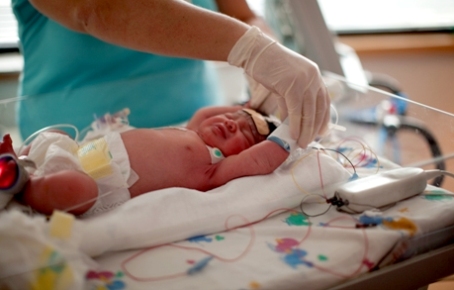
Feature published in CTSA Newsletter October 2011
Helping medical advances reach patients sooner is what the CTSA program is all about, which is why Dr. Michael Weiss, a neonatologist at the University of Florida, approached the UF Clinical and Translational Science Institute for help. Weiss had a vision to ensure the estimated 200 to 300 neonates in Florida at risk each year for long-term brain damage due to moderate to severe hypoxic-ischemic encephalopathy, known as HIE, have access to a cooling technique that is the only known treatment proven to protect brain function. The therapy, which uses a special blanket or cap to cool an infant’s body temperature, must be administered within the first six hours of life to be effective. Several clinical trials, including a multicenter trial led by the NIH National Institute of Child Health & Human Development’s Neonatal Research Network, employed this therapy and found it to be effective for approximately one in eight babies who are candidates for the therapy — babies who previously did not have an evidence-based treatment option.
The UF CTSI ensures that investigators like Weiss have the resources they need to more rapidly translate scientific findings into medical practice. The CTSI facilitates collaborations that strengthen the state’s capacity for conducting research and implementing best practices to improve health. For Weiss, that meant connecting him with the resources required to establish a statewide network: expertise; a secure database with multi-site, Web-based access on the CTSA-supported REDCap platform; space to store biological samples in the UF CTSI Biorepository; and staffing support from a trained research coordinator to help launch the Florida Neonatal Neurologic Network.
Launched in June with eight affiliated hospitals, the network is designed not only to improve quality of care and access to care, but also to facilitate research to improve outcomes and develop new therapies for newborns with brain injuries. The network positions Florida as one of the first states to implement unified standards for administering the cooling therapy and managing day-to-day care for this patient population.

